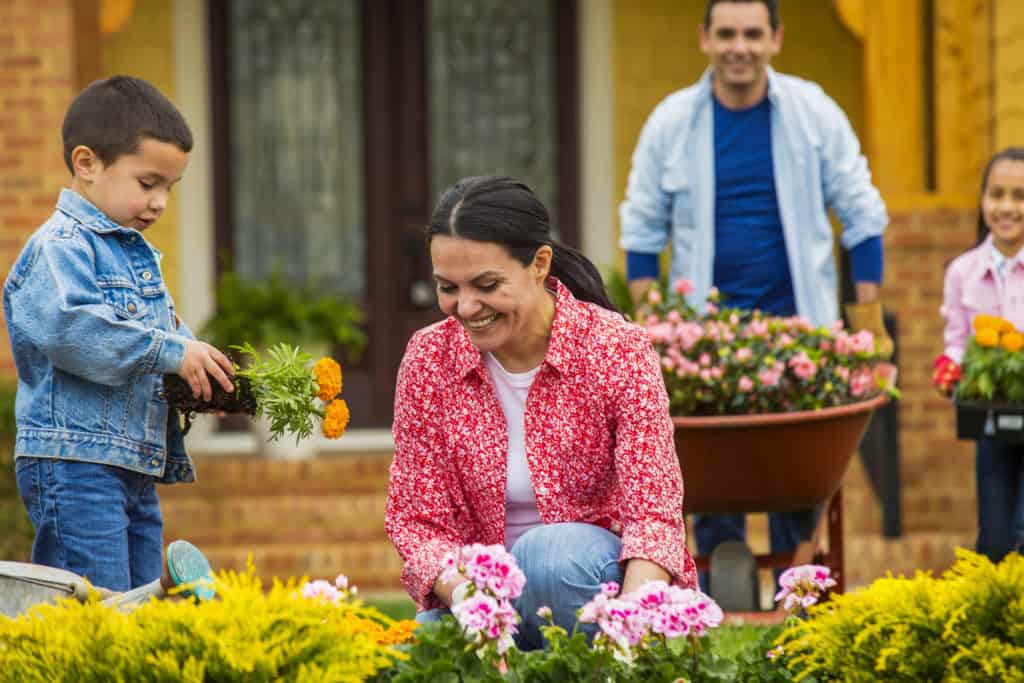
By Gordon Clark, UVM Extension master gardener
As we endure the current coronavirus pandemic, precautions need to be taken in all activities outside our homes. But during such a difficult time, we also should be aware of the singularly profound health benefits of gardening.
Many people work in community gardens, where new rules of operation are being formulated for this spring, but such guidelines should not prevent us from enjoying our gardens, at home or elsewhere. Of course, no one needs to tell a New Englander about the benefits of being outside after a long winter, but science is filling in the how and why.
Fresh air: Studies have shown that fresh air is good for cleaning the lungs, improving circulation and providing greater energy and vitality. Increased oxygen intake helps boost brain levels of serotonin, a neurotransmitter nicknamed the “happy chemical” because it combats anxiety and depression and helps maintain a healthy emotional state and general well-being.
Sunlight: While there are obvious risks to too much unprotected exposure, moderate amounts of sunlight bring many benefits. For starters, the UV rays in sunlight are known to kill and suppress germs and bacteria. (Experts say it’s not strong enough to kill the coronavirus, but the overall disinfectant effect is still a good one.)
Upon exposure to sunlight, the skin metabolizes Vitamin D, the only major vitamin produced in this way. Vitamin D is essential for numerous body functions, and sunlight has been shown to lower blood pressure and improve bone strength and brain functioning.
Not surprisingly, sunlight also provokes the brain to produce serotonin, which is why sunlight is an effective anti-depressant and treatment for Seasonal Affective Disorder. (Its relative absence in winter is the primary cause of SAD.)
Soil: This is where it gets really magical. Any gardener can tell you that the health of a garden and its plants is bound up in the diverse abundance of microbial life in the soil. Some microbes are bad (pathogens), but most are either benign or, in fact, necessary for increasing nutrient uptake by plants, decomposing organic matter, controlling disease and numerous other basic soil functions.
But what if the microbes that make for healthy soil also promote the health of humans who work in it?
We know that exposure to soil microbes, particularly in childhood, helps to build a more robust immune system and resistance to asthma and allergies. Recent studies demonstrate that soil microbes such as Mycobacterium vaccae can act as anti-depressants as well, activating groups of neurons responsible for producing, you guessed it, our friend, serotonin.
Physical activity: Gardening and landscaping activities provide moderate to vigorous physical activity, particularly when most of the work is performed using hand tools. It’s a form of stealth exercise in which you are lifting, squatting, pushing, pulling and stepping without even realizing it. Gardening provides health-enhancing, weight-bearing exercise that increases caloric expenditure, builds strong muscles and bones and supports balance and endurance.
It gets even better. That’s because gardening gives you the opportunity to grow food. Awesome, fresh food. Nothing maintains your immune system and general health and energy like fresh fruits and vegetables, which are most nutritious right after harvest.
In addition, kids and adults are more likely to eat fruits and vegetables tended with their own hands. Gardeners can control how their food is grown, often resulting in no or less herbicide and pesticide use.
These are challenging times, and it is more important than ever to stay healthy. One of the healthiest things you can do is to grow food in your own garden. So be careful. Stay safe. But by all means, get your gardening on!




